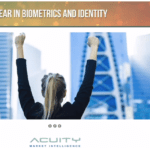Welcome to FindBiometrics’ digest of identity industry news. Here’s what you need to know about the world of digital identity and biometrics today:

Socure Teams Up with Online Notarization Specialist Proof
Proof and Socure, two leading companies in identity assurance technology, have partnered to enhance fraud detection capabilities. By integrating Proof’s behavioral and data signals with Socure’s advanced digital identity verification and fraud risk assessment, the combined solution aims to create a comprehensive defense system. The system will analyze 30,000 real-time signals, including biometric data, device intelligence, and geolocation, to ensure secure and identity-assured transactions across various sectors.
Sumsub Extends Non-Doc Identity Verification Across Scandinavia
Sumsub has expanded its document-free identity verification solution (Non-Doc) to Norway and Denmark, now reaching over 2.9 billion people worldwide. Non-Doc allows for quick and secure user onboarding in as little as 4.5 seconds, using biometric or device authentication and data from authoritative sources. It is particularly useful in developing economies where traditional paper documents may be unreliable. The solution can be used throughout the user journey, and a new feature now verifies addresses using secure databases. Sumsub plans to further expand Non-Doc to other countries, aiming to cover over 95 percent of the population in Hong Kong and Ivory Coast.
Visa Brings Passkeys to Online Payments in Major FIDO Victory
Visa has launched a new payment service, Visa Payment Passkey Service, allowing customers to authorize online payments with biometric scans on their smartphones or computers. This service is built on Visa’s own Fast Identity Online (FIDO) server and enables merchants to easily integrate it into their checkout process. Consumers can use their existing biometric authentication methods for payments after a one-time enrollment. The passkey concept, developed by major tech companies like Apple, Google, and Microsoft, leverages FIDO protocols to bind authentication credentials to users’ mobile biometrics.
Philippines House Passes Bill to Register Foreign Voters
The Philippines House of Representatives has passed a bill allowing online registration and voting for overseas Filipino workers (OFWs). The bill mandates the collection of biometric data of qualified overseas voters by the Commission on Elections (Comelec) through its Office for Overseas Voting. The move aims to increase voter participation among overseas Filipinos by making registration and voting more accessible through web-based portals and internet-based technologies, while ensuring compliance with the Data Privacy Act of 2012 to protect personal data.
Worldcoin Upgrades Biometric Processing System, Deletes Old Iris Codes
Worldcoin has upgraded its biometric processing system with a new Secure Multi-Party Computation (SMPC) system to enhance the security and privacy of iris code data. The system encrypts and distributes iris codes among multiple parties, enabling computations without revealing the actual data. This approach ensures that iris codes remain encrypted throughout the deduplication process, improving upon previous methods that required decryption for each comparison. After migrating to the new SMPC system, Worldcoin securely deleted old iris code data and the previous system.
ADT Uses Google Nest to Let in the Dog Walker
ADT has upgraded its ADT Plus home security system by integrating facial recognition technology from Google Nest. The new feature, “Trusted Neighbor,” allows homeowners to grant automated access to trusted individuals using facial recognition. The system recognizes familiar faces through Nest cameras and can disarm the security system, granting temporary access to the home. ADT Plus also includes smart home technologies like smart locks and sensors, controlled via the ADT Plus app.
Integrated Biometrics Launches ‘Smallest, Lightest’ Palm Scanner
Integrated Biometrics has launched Mannix, the world’s smallest and lightest FBI-certified palm scanner. Designed for in-the-field use, this mobile device features smartphone connectivity and utilizes the company’s patented Zero Bezel Film (ZTX) and LES technologies for durability and high-quality image capture in various conditions. The scanner’s compact size, lightweight design, and ruggedness, combined with its ability to be powered by a mobile phone, enhance its usability.
Google Is Letting Users Control Apps with Their Facial Expressions
Google’s Project Gameface, unveiled at Google I/O, uses biometric and facial recognition to allow users to navigate devices using facial gestures. Initially designed for hands-free gaming, its recent update allows developers to incorporate it into Android apps, expanding its functionality. The project uses a device’s camera and MediaPipe’s Face Landmarks Detection API to track and translate facial expressions into cursor movements. It is particularly beneficial for individuals with disabilities, offering a cost-effective solution for digital interaction. The latest enhancements include recognition of 52 facial gestures with customizable sensitivity. Google is partnering with Incluzza to explore its use in various settings beyond gaming.
Saudi Arabia Announces Digital ID for Hajj Pilgrims
The Saudi Ministry of Interior has launched a digital identity service for Hajj pilgrims as part of its digital transformation efforts. Developed in collaboration with several ministries and the Saudi Data and Artificial Intelligence Authority (SDAIA), the digital ID aims to improve the pilgrim experience by simplifying identification and streamlining services. The initiative aligns with Saudi Arabia’s Vision 2030, which emphasizes using technology to enhance service quality and efficiency. The digital ID, accessible through the Absher and Tawakkalna platforms, enables pilgrims to verify their identity electronically during their stay in the Kingdom.
Australia’s Northern Territory Commits to Mobile ID Pilot
The Northern Territory Government in Australia is investing $20.66 million to introduce digital IDs for smartphones. The initiative will enable residents to store their driver’s licenses and Evidence of Age cards in a digital wallet, enhancing convenience and security. The digital IDs will integrate with other government systems, including the Banned Drinker Register and NT Police devices. While physical licenses and cards will still be available, the digital versions provide more control over information sharing with businesses. The project aligns with the government’s digital transformation plan and aims to improve access to essential services, with a pilot program expected to launch in 2025.
–
May 17, 2024 – by Tony Bitzionis and Alex Perala








Follow Us